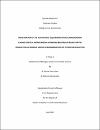INVESTIGATION OF THE NUTRITIONAL REQUIREMENTS AND CORRESPONDING CODING GENES OF HYDROCARBON-DEGRADING BACTERIAL STRAINS FOR THE PRODUCTION OF BIOMASS USEFUL IN BIOREMEDIATION OF PETROLEUM POLLUTION
| Advisor | Zouari, Nabil |
| Advisor | Jaoua, Samir |
| Author | Attar, Al Zahraa Omar |
| Available date | 2015-12-06T07:38:40Z |
| Publication Date | 2015-06 |
| Abstract | Petroleum-derived contamination events constitute one of the most dominant sources of environmental deterioration in the industrialized countries. Hydrocarbon compounds are recognized as toxic and carcinogenic organic pollutants and environmentally persistent. Bioremediation efforts aim to confine, restrain and mitigate the magnitude of contamination, in order to prevent additional decline of the environment and to protect all life forms from exposure to hazardous materials. The aim of this project is to study the role of medium components on the growth and biological activity of three locally isolated hydrocarbon degrading Pseudomonas aeruginosa strains. Furthermore, a factorial investigation of the strains’ potentiality to degrade diesel hydrocarbons by manipulating the nutritional microenvironment has been conducted. Then, stains are screened for genes encoding for hydrocarbon degradation activity. Results clearly showed the major role of nutritional elements such as carbon (supplied solely as diesel), nitrogen, and phosphorous play on the growth and metabolism of hydrocarbon degrading strains. Some strains were found tolerant to higher diesel concentrations under certain growth condition, but not in another. Inhibition by elevated carbon (diesel) concentration by the second week of culturing was noted. Nitrogen was significantly affecting cells growth under all experimental conditions and to a lesser extent was phosphorous. The strains’ response to altered growth conditions varied substantially; although they were from the same taxonomical group. Some strains were found more sensitive to changing C/N/P ratios than others. The analysis of diesel removal by GC confirmed the capability of our strains to degrade hydrocarbons under different growth conditions. Molecular investigation of our strains demonstrated that one Pseudomonas aeruginosa strain (QDD1) possessed the alkB1 gene encoding for alkane hydroxylase enzyme participating in the catabolic pathway of n-alkanes. The other strains were found to lack this particular gene. The genetic makeup of strain QDD1 was distinguished to be different from other strains as well as its biodegradation potential and its sensitivity to nutritional manipulations. The Arabian Gulf including Qatar is recognized as one of the most oil contaminated areas worldwide. With the experience of the worlds’ largest and most devastating oil incidents in history and with the natural and anthropogenic stresses; the Gulf environment is highly vulnerable and susceptible to further deterioration. This research project attempts to use the technology of microbial bioremediation in order to solve the environmental pollution resulting from the oil and gas industry. It will be the best local environmental-friendly solution and the most favorable for maintaining Qatar's environment sustainability. To the best of our knowledge, the work of this project is the first in the state, which investigates the naturally existing microbes in remediating petroleum pollution. Qatar’s extreme weather conditions and the special characteristics of local soils make this project of interest to implement local microbes in local polluted areas. |
| Language | en |
| Subject | Petroleum pollution Waste management Qatar soil |
| Type | Master Thesis |
| Alternative Abstract | يعد التلوث الناجم عن النفط ومشتقاته أحد أهم مصادر التدهور البيئي في الدول الصناعية. وتصنف المركبات الهيدروكربونية على أنها ملوثات عضوية سامة ومسرطنة وتقاوم التحلل. تهدف جهود المعالجة البيولوجية إلى حصر وتخفيف درجة التلوث؛ سعيا لمنع المزيد من الأضرار البيئية وحماية كل أشكال الحياة من التعرض للمواد الضارة. يهدف هذا المشروع البحثي إلى دراسة دور مكونات الوسط المستخدم لزراعة البكتيريا في النمو والنشاط البيولوجي لثلاث عينات بكتيرية قادرة على تحليل المواد الهيدروكربونية عزلت محليا من سلالة Pseudomonas aeruginosa . بالإضافة إلى إجراء دراسة تفصيلية حول دور مكونات البيئة الغذائية للخلايا البكتيرية من خلال التحكم بثلاث عوامل: الكربون، النيتروجين، والفوسفور. كما يهدف المشروع للقيام بمسح جيني بحثا عن الجينات المسؤولة عن تحليل المواد الهيدروكربونية بين العينات الخاضعة للدراسة. كشفت نتائج البحث بوضوح الدور الهام للعناصر الغذائية مثل الكربون، والنيتروجين، والفوسفور وتأثيرها على نمو الخلايا البكتيرية وعلى عمليات هدم وتحليل المركبات الهيدروكربونية. بعض العينات أظهرت قدرة على تحمل تراكيز عالية من الديزل )المصدر الوحيد لعنصر الكربون( عند زراعتها في وسط دون آخر. لوحظ انخفاض النمو البكتيري في الأسبوع الثاني من الزراعة عن استخدام تراكيز عالية من الديزل. بينما كان تأثير النيتروجين إيجابي ا وهاما على نمو الخلايا، في حين بدا أن الفوسفور يؤثر بشكل أقل. وعلى الرغم من كون العينات البكتيرية الثلاث تنمتي لنفس السلالة التصنيفية، إلا أنها تجاوبت بشكل مختلف مع ظروف النمو المستخدمة. وجدنا أن بعض العينات أكثر حساسية لتغير نسب العوامل الغذائية )الكربون: النيتروجين: الفوسفور( من البعض الآخر. كما أثبت تحليل طبقة الديزل باستخدام تقنية Gas Chromatography قدرة العينات البكتيرية الخاضعة للدراسة على تحليل المواد الهيدروكربونية في مختلف الأوساط الغذائية. من جهة أخرى، تبين من الكشف الجزيئي أن العينة QDD1 تمتلك الجين alkB1 المسؤول عن إنتاج إنزيم alkane hydroxylase والذي يساهم في هدم المركبات الألكينية. وقد لوحظ اختلاف المكونات الجينية لهذه العينة بالإضافة لاختلاف سلوكها البيولوجي وحساسيتها للبيئة الغذائية المحيطة. تعرف منطقة الخليج العربي في السجلات العلمية كإحدى أكثر المناطق تلوثا بالنفط ومشتقاته حول العالم. بالعودة إلى التاريخ، نجد أن منطقة الخليج قد تعرضت لأحد أكبر أحداث التسرب النفطي وأشدها تدميراً على الصعيد البيئي. أضف إلى ذلك الظروف الطبيعية الصعبة التي تتعرض لها المنطقة والضغوطات البشرية الهائلة التي تشهدها. كل ذلك يجعل النظام البيئي في منطقة الخليج هشا ومعرضا لمزيد من التدهور. هذا المشروع البحثي يحاول استخدام تكنولوجيا " المعالجة الميكروبية " من أجل إيجاد حلول للتلوث الناجم عن صناعتي الغاز والنفط في المنطقة. وبالتوافق مع التنمية البيئية المستدامة لدولة قطر، يعد هذا البحث الأول من نوعه بحيث يدرس ميكروبات البيئة المحلية ومدى أهليتها لتحليل الملوثات البترولية. |
| Department | Biological and Environmental Sciences |
Files in this item
This item appears in the following Collection(s)
-
Biological & Environmental Sciences [111 items ]



